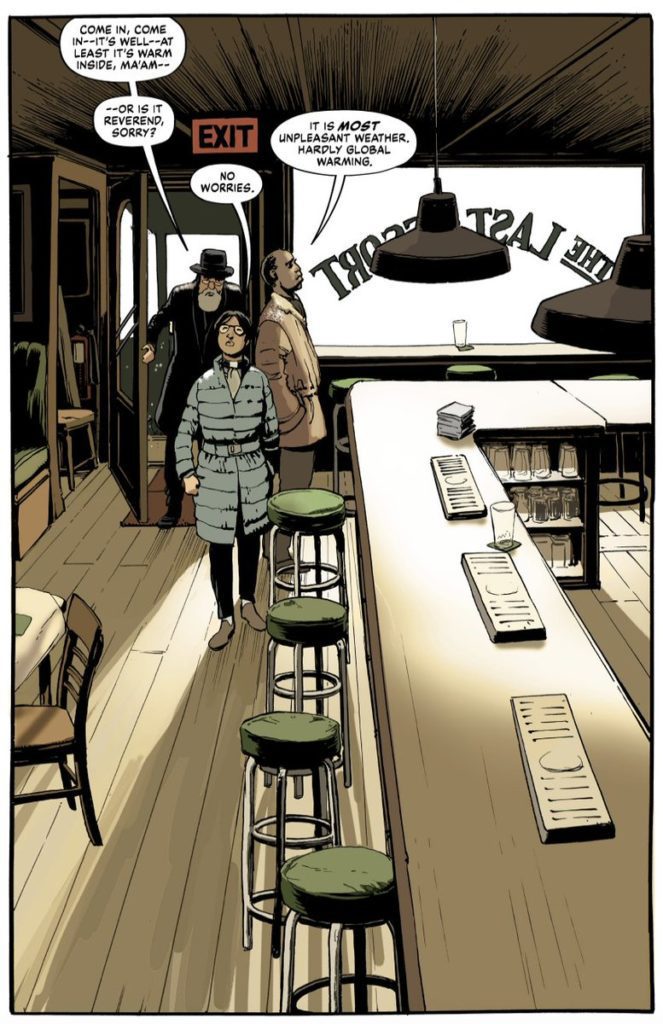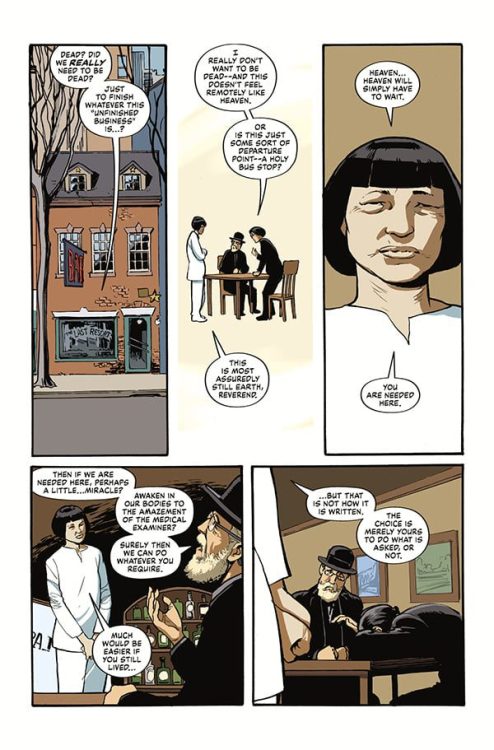An unabridged version of this interview was originally published on the site Popular Culture and Theology by Monkeys Fighting Robots writer Matthew Brake.
Matthew Brake: I know you and I have talked a little bit about the inception of this story, but could you talk a little bit about your motivations for writing Unfinished Business?
Paul Levitz: I don’t think I’m ever quite sure what motivates me to write something that isn’t an assignment along the way. Mike Richardson over at Dark Horse was asking me what I wanted to do next. He was suggesting at the time that the preferred format they were working in was four-part miniseries.
Okay, what do I feel like doing?
Tim Hamilton, who I had worked with on Brooklyn Blood, my immediately preceding project for Dark Horse, wasn’t in the mood to do more of that. He was playing with children’s books for a while to figure out something new to do, and this came to me.
Brake: Say a little bit more about that, because you’ve said before that this story is, in part, inspired by a joke.
Levitz: Oh, I mean, the heart of the story, obviously, is the opening joke about “a rabbi, a priest, and a minister walk into a bar.” There’s lots of variations on it. But that’s sort of a classic gum line and then what’s the payoff for it? And I went to, perhaps, the most extreme possibility.

Brake: So that was the inception, and then, was it taking that joke and then crafting the story of where this could go? Or did you already have some ideas in mind about a message you were trying to convey?
Levitz: It’s not so much a “message story.” As a writer, I think my philosophies or my politics are relatively transparent within my work, but I don’t usually sit there and say, “This is a time to do a tract about or this is a time to do a sermon about [blank].” I had a dear old friend who was down with cancer at the time who was a rabbi. That may have been a piece of the influence. I wanted to do a story that could sort of include him. I mean, the rabbi in the story is not defined as being of the same sex and behaviors as my friend, David, but he was a bit of an homage to him and probably part of that came from conversations I was still having with David in the years of his illness.
Brake: I do want to come back and talk about your friend David later because I appreciated your afterword where you discuss that relationship. But when you’ve come to my class, you’ve spoken about the difference between art and craft and how with craft you put together a story where you understand the mechanics of the story, can write a story correctly, and meet a deadline. However, with art, it can come from a more personal place. I’m curious with this story, the craft is there, but would you call it art because it comes from a personal place?
Levitz: You know, art is in the eyes of the beholder to some extent, and I don’t know that what I accomplished with the story rises to my definition of art. I think a lot of it was based in my craft. To the extent it was art, it was because I was touching subject matter that was unusual for me to play with and that opens some interesting doors to being thoughtful about it.
Brake: I appreciated the way the three protagonists come together. They come together. They’re uneasy with each other, and then for a time, they part ways. It almost reminded me of the Chinese restaurant scene from the Defenders on Netflix where you have Daredevil, Luke Cage, Jessica Jones, and Iron Fist come together.
Levitz: I didn’t see that series, so I don’t know the reference. But I can imagine.
Brake: It’s sort of worth the watch…well, about half sort of worth the watch (laughs).
But I liked how the minister, the rabbi, and the priest seem almost like superheroes gathering. Before they become a team, they’re uneasy with each other. Then they temporarily part ways, but they come back together later. Did the structure of that kind of superhero storytelling affect any of your writing or those character decisions?
Levitz: That’s an interesting question.
Maybe.
I mean, most of the stories I’ve done in my life use superhero tropes. But I think part of it was really an attempt to capture a very human moment. There are times in our lives when circumstances throw us together with people we wouldn’t actually be together with. You don’t really have room in the structure of a comic to go through that, but in the real world, you go through that exercise that is a search for common ground: “Where did you go to school?” “What did you study?” “Where did you grow up?” “I don’t recognize that accent.”
All of the kind of dumb opening lines aren’t pickup lines, but are part of how we connect to each other. We search for what we have in common. I’ve never had the privilege of being in a room with multiple religious figures from different religions, but I would certainly imagine that it’s a different kind of dance. And certainly, if you’re dealing with a very Orthodox rabbinical figure, they’re generally not comfortable around women. They have a host of formal prescriptions of what they can and cannot do in the presence of a woman, including any physical contact.
I think the two Christian figures would not have as complicated of a situation but still would have some interesting barriers. The Catholic priest was deliberately chosen out of the African tradition which is perhaps more classical or more conservative than the American, and the idea of a woman priest/minister would be perhaps not uncomfortable in the same way as it would be to an Orthodox Jew, but confusing in some fashion. And then the woman comes out of a very open liturgical tradition and how does she fit with all of this? How does she deal with people who may be more closed-minded? Does she take offense? There isn’t a lot of room to explore all of that, but some of that takes place in the subtext. I did my best to indicate that all three of these people were people of genuine religious belief and sincere faith, living out whatever the right way is that they would feel their faith should be expressed. But being in that room and that bar would confuse anyone alive or dead, including them, no matter how sincere their beliefs.
The bartender, whatever the bartender represents, whether it is a sending of God or a secondary or tertiary supernatural figure, how do you react to that, and that would certainly be a bewildering moment.
If my memory serves, I wrote most of this before The Good Place was on the air. A wonderful, wonderful show. But to some degree, when I saw it, it reminded me of what I was trying to do. Kristen Bell’s character shows up, “Where am I? What am I?” and Ted Danson is feeding her the bill of goods. Does she buy into it entirely? What makes her suspicious of it at what point? Lovely, lovely show. Beautifully written.
Brake: I did want to ask you about the bartender. It’s interesting you throw in a little bit of ambiguity about who she represents. As I was reading it, I was reading her as a God figure, which I found interesting because it made me think of the book The Shack, which is about a man who is dealing with the loss of a child and goes into a shack and encounters God. The author is a Christian, so his God is Trinitarian, but God the Father appears as a Black woman, for instance, and all the different members of the Trinity appear as various ethnicities, genders, and so on, so I found that interesting. I wasn’t sure if there was influence there. But if this figure does represent God, I appreciated the choice of having her be an Asian woman whose age we can’t quite identify.
 Levitz: [Simon] Fraser gets a lot of the credit for that. He didn’t care for my original description of the bartender, which was probably more traditional, and he came up with this figure, which I thought was wonderful, and then I wrote to it as best I could. I think in any modern way of looking at religion, whether you go to the ancient traditions that the Jews had or the Muslims adopted, you cannot depict God. Any modern way of looking at it has to concede that either we cannot understand what God physically could represent as, if there is such a figure, and the whole idea that we are created in God’s image has to be a metaphorical statement.
Levitz: [Simon] Fraser gets a lot of the credit for that. He didn’t care for my original description of the bartender, which was probably more traditional, and he came up with this figure, which I thought was wonderful, and then I wrote to it as best I could. I think in any modern way of looking at religion, whether you go to the ancient traditions that the Jews had or the Muslims adopted, you cannot depict God. Any modern way of looking at it has to concede that either we cannot understand what God physically could represent as, if there is such a figure, and the whole idea that we are created in God’s image has to be a metaphorical statement.
And what it means, whether that image is in the image of the mind of God or the image of the biochemistry of what God envisions, we don’t get to know. And any discussion of the physical image of God just sort of reminds me of the scene in Avenue Q where they start arguing back and forth, and the actor who’s playing a pseudo-Gary Coleman is loudly announcing that God was a black man, and I think it’s the Princeton character who responds to him by pointing out, “No, no. Jesus was Jewish,” and everybody just cracks up and that’s the end of it. This is obviously an incomprehensible contradiction to this group of people.
Brake: This question is more tongue-in-cheek, but I can’t help but notice that of the three “people of the cloth,” the Jewish rabbi comes out looking the best. Personal bias creeping in perhaps? (laughs)
Levitz: Probably. I mean, I tried to give them each their moment. The priest gets sort of the physical victory in the process and gets the most directly tortured, so he overcomes the most in it. Reverend Moore gets sort of the most personal battle in dealing with her unborn child. I obviously have my biases, and, as I said, part of the inspiration for the book was to do something in honor of David, who did not get to read the book ultimately or read the script, but I had hoped he would be around long enough to.
Brake: One of the things I do appreciate about this volume, as I said, is your personal afterword where you acknowledge your religious heritage, coming from a Jewish background, while also acknowledging your own lack of adherence to organized religion.
But I want to return to the figure of Dr. David Kaufman, who you name your Jewish rabbi protagonist after. I’m wondering if you could say something about his influence on you because you mentioned your conversations with him. So was he someone you engaged in conversations of religion and spirituality with? And if so, would you mind providing some insight into the nature of some of those conversations? Were they religious and theological inquiries? Were they of a personal nature? You can also decline to answer of course if that’s too personal.
Levitz: David and I had an interesting journey. As a young man, he was a student in English at Tulane. He loved the Legion of Superheroes and would send long, long letters about it, many of which were published, and we connected through that. He was an aspiring comic writer, and we connected a little bit on that. And then he kind of vanished from my radar.
He popped up again a couple of decades later as an English professor at Tulane who was looking to connect to the actor who was playing Jimmy Olsen on Lois and Clark to get him to New Orleans for a menorah lighting ceremony, if I’m remembering correctly, and he was hoping I could help him with that. Ultimately, that didn’t work out. This was after Katrina maybe. A little time had passed. A lot of renewal was happening in New Orleans at that moment.
Anyway, we got back in contact, and he had converted to a Hasidic order. He was brought up relatively secularly, so this was a sizable conversion. We never talked about what motivated him to the conversion. He had a pack of kids and a complicated life structure around all of that. He was qualified technically as a rabbi but was not functioning as whatever the equivalent for a parish rabbi would be. I don’t know what the right term for that is. His personal philosophy and work were remarkably worldly and liberal for a member of that Hasidic order. He made part of his living writing for politicians, speech writing and things like that, and often for liberal politicians, which was a fascinating contradiction.
He was an aspiring detective storywriter, and he wrote a couple of novels that, as he went through different drafts, he sent back and forth to me and we’d give it them look. They often turned on plot points that were based in Jewish lore or Jewish culture with a pair of detectives who were an orthodox Jew and an Irishman. Both very vividly depicted. We got together a number of times in New York and at least once in New Orleans. I got the chance to visit him when I was down there for Neil Gaiman’s birthday party that he threw when he turned 50. While there, I got a window into his life a little bit and part of the time during that period was a particularly challenging time in my life, and he provided good counsel through it that was very helpful to me.
You can read the full unabridged interview on Popular Culture and theology by clicking here, and be sure to check out Unfinished Business at the Dark Horse website or your local comic book store!

